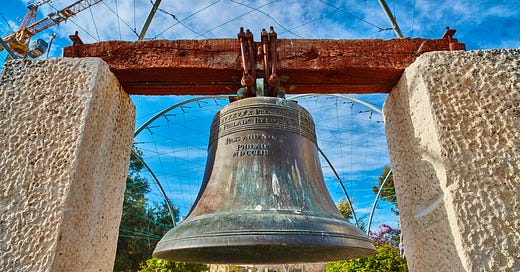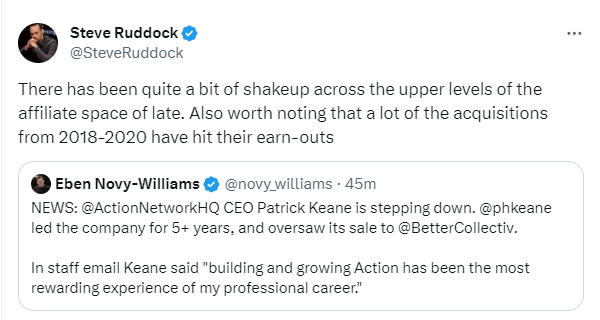I Didn't Hear No Bell
New York Gov. Kathy Hochul didn't mention online gambling in her budget, but State Sen. Joseph Addabbo isn't ready to throw in the online casino towel.
The Bulletin Board
NEWS: Will supporters continue to push for legalizing online casinos in New York if Gov. Kathy Hochul doesn’t embrace the effort?
NEWS: Fintrac releases bulletin linking online gambling to money laundering.
NEWS: Ontario’s online gambling market continues to mature: Sets new revenue record in Q3.
QUICK HITTER: An Ohio committee gets the ball rolling for a possible online casino push in 2025.
AROUND the WATERCOOLER: Top-tier affiliate free agents available.
STRAY THOUGHTS: Affiliates are really good at what they do.
SPONSOR’S MESSAGE - Underdog: the most innovative company in sports gaming.
At Underdog we use our own tech stack to create the industry’s most popular games, designing products specifically for the American sports fan.
Join us as we build the future of sports gaming.
Visit: https://underdogfantasy.com/careers
NY Online Casino Supporters Will Press Ahead
The hope of legal online gambling in New York suffered a severe blow last week when New York Gov. Kathy Hochul failed to mention online gambling in her budget or during the press conference.
State Sen. Joseph Addabbo had told Play USA, “Without the governor embracing this, we’re not going to do it. I won’t even advocate for it to be in the Senate… if the governor won’t embrace it.”
But Addabbo isn’t giving up just yet.
Speaking with industry reporter Robert Linnehan, Addabbo outlined a possible path forward during the budget negotiation process.
“The governor did a fine job laying out the game plan about where she wants the state to go and what she wants the state to do. But, in that press conference and the executive budget, there’s no how to get these things accomplished or how to move forward,” Addabbo said. “That’s what the budget negotiations are for over January, February, and March. That’s where I’m hopeful we can have a conversation about iGaming.”
Addabbo put the onus on the governor, saying it was up to her to piece the puzzle together. However, the puzzle is a jumbled mess, as Addabbo listed the many moving pieces, “The legislature, her administration, the union, the advocates, the brick-and-mortar casinos, the tribal leaders; it’s all going to take a collective effort here for what is really going to be the final iGaming and iLottery product.”
Sponsorship opportunity
Want to sponsor the fastest-growing newsletter in the gambling space? Straight to the Point has multiple sponsorship opportunities available.
Reach out to Steve at iGamingPundit.com for more details.
The Return of Online Gambling and Money Laundering
In a new report, the Financial Transactions and Reports Analysis Centre of Canada (Fintrac) cautions that online gambling is a funnel for money laundering.
One method money launderers can use, per The Canadian Press, “was the purchase of prepaid cards or vouchers using suspected proceeds of crime. They were then used to deposit money into gambling accounts, followed by withdrawals through wire or e-transfer to a Canadian bank account under the guise of winnings.”
Fintrac also mentioned bank accounts. According to Fintrac, ill-gotten funds deposited into bank accounts could quickly be used to make deposits on online gambling sites, including “transactional activity that appeared circular in nature where funds were received and sent back to the same gambling sites multiple times.”
You can read the Fintrac report here.
Money laundering has long been an online gambling bogeyman.
In 2014, former New York Gov. George Pataki co-authored a USA Today column that reads in part:
In a September 2013 letter to Congress, the FBI warned that while many industries are vulnerable to money laundering, Internet gambling goes a step further by providing an anonymous forum for bad actors to move money undetected.
Pataki and co-author James Thackston went on to cite a 2013 FBI letter that says:
"Online gambling, therefore, may provide more opportunities for criminals to launder illicit proceeds with increased anonymity. Individuals may use a wide array of mechanisms to conceal their physical location, or give the appearance of operating in a different jurisdiction, when accessing a website."
"Online casinos are vulnerable to a wide array of criminal schemes. For example, criminals may participate in games with exclusively criminal players, exchanging money to launder criminal proceeds…Individuals may use a wide array of mechanisms to conceal their physical location, or give the appearance of operating in a different jurisdiction, when accessing a website…some sophisticated methods would be difficult to readily identify or deter."
While possible, these arguments have always been shaky (the FBI letter outlined possible scenarios), as there is little anonymity or capability of masking one’s location on licensed, regulated online gambling sites. Land-based casinos, where an anonymous could bring cash, and unlicensed offshore sites with fewer KYC and AML protocols (as well as acceptance of cryptocurrencies) provide a much better opportunity to cleanse money.
Ontario’s Online Gambling Market Sets Record in Q3
The Q3 2023 numbers have been posted by iGaming Ontario, and suffice it to say that Ontario’s’ regulated online gambling market is on the ascent.
The province’s 49 licensed operators (72 websites) generated CAD$658 million (about $487 million in USD) in revenue from CAD$17.2 billion in wagers. Wagering ballooned in Q3 as Q1 and Q2 saw total bets at CAD$14 billion and CAD$14.2 billion, respectively. Of note, Q3 in Ontario is October, November, and December, which means we are likely seeing a football season bump.
Most of the increase comes from an influx of new bettors, as the number of player accounts went from 950,000 in Q2 to 1.2 million in Q3, a 21% increase. The number of gambling sites was relatively static: 71 in Q2 and 72 in Q3.
The report from iGaming Ontario shows growth in wagers and revenue in each of the first three quarters of 2023:
The bulk of the wagers and revenue in Q3 came from online casino games:
Casino games: $13.7 billion (79%) of total wagers and $471 million (71%) of gaming revenue.
Sports betting: $3.1 billion (18%) of total wagers and $171 million (25%) of gaming revenue.
Poker: $431 million (2.5%) of total wagers and $17 million (2.5%) of gaming revenue.
How do those numbers compare to US markets? The best comparison by population and online products available is Pennsylvania:
Ontario: Population = 14.5 million; Online gambling launch = 2022
Pennsylvania: Population = 13 million; Online gambling launch = 2019
Pennsylvania’s online gambling revenue in October, November, and December was $598 million, or $46 per resident. Ontario’s revenue tally of $487 million USD puts the per-resident online gambling spend at $35 - a solid showing for a still maturing market.
Quick Hitter: Ohio Starts Online Casino Conversation
Ohio has created the Ohio Sports Gaming Study Committee, which will hold four meetings in 2024, including a discussion of online casinos on February 20, per Play USA’s Matthew Kredell.
The other three meetings will discuss the following:
February 22: iLottery
March 19: Racinos/charitable gaming
March 20: Sports betting and daily fantasy sports
Ohio is unlikely to become 2024’s online casino dark horse; instead, it sets the stage for a potential push in 2025 or beyond.
Committee co-chair Jay Edwards told Play USA the state is in good shape financially (which can change quickly) and “there’s no bill introduced or anything like that. What we’re trying to do is start the conversation, get best practices, educate members, and allow regulators some input on the process so that when we are ready, we can start to implement that.”
Around the Watercooler
Social media conversations, rumors, and gossip.
A lot of affiliate industry talent is being rereleased into the wild. The latest is Action Network CEO (and original investor) Patrick Keane. But Keane is far from the only person with a company gobbled up by a major affiliate in the early days of the US sports betting boom that has reached their earnouts and can now move on to new projects.
As I mentioned on X:
In addition to founders, several top content talents have also been let go, including two people I would put in my S-tier: Ben Fawkes and Eric Raskin - they may still be available if anyone is looking for top talent, but I wouldn’t wait too long.
Stray Thoughts
Sticking with affiliates. I do a lot of Googling, and the below tweet is not limited to Google News. It’s a source of endless frustration whenever I type a question in the search bar.
Enter any query about gambling in a state, and you are bombarded by State + Sports Betting + Promo Code. And as the tweets above and below (with its affiliate ad doom-scroll that needs to be seen to be believed, seriously, click the tweet link) indicate, filtering by news doesn’t help.
It’s gotten so bad that I often use ChatGPT and Grok as search engines. Affiliates are really good at what they do, but it can make finding information nightmarish.
The only larger annoyance is if you search for the tax rate in a particular state, the first 50 returns are the tax on winnings a player is responsible for.
More troubling is the amount of misinformation a Google search can return from offshore and licensed affiliates.









